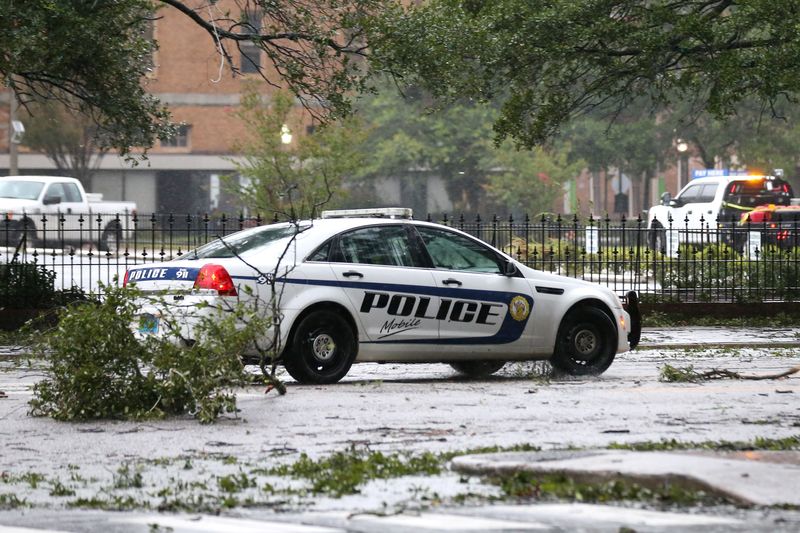Alabama city weighs change in body-cam release policy after public outcry

A Mobile Police Department vehicle drives down Government Street during Hurricane Sally in Mobile, Alabama, U.S., September 16, 2020. REUTERS/Jonathan Bachman/File Photo
(Reuters) — An Alabama city council on Tuesday discussed an ordinance to require police to provide a valid «legal reason» for denying a request for releasing body-camera footage, a measure that comes amid an outcry over a Black man’s death at the hands of police.
For months, critics of the Mobile Police Department have called for the full release of video showing a July 2 encounter in which Jawan Dallas died after officers used a Taser on him during a burglary call.
The victim’s family and attorney were allowed to view the footage on Nov. 22, after a grand jury declined to bring charges against the officers involved.
Under an Alabama state law that took effect in September, relatives and attorneys for individuals who are captured in body-camera footage are allowed to request access to the recording, but they may not copy or record it, making public dissemination impossible.
Harry Daniels, the Dallas family’s lawyer, said in a news conference afterwards that it was «one of the worst videos of a police killing» he had ever seen, and said it showed Dallas telling the officers, «I do not want to be the next George Floyd» while struggling to breathe.
Police body-cam video and footage from bystanders has provided crucial evidence in many recent cases of alleged police violence against Black people, including the 2020 killing of George Floyd by a Minneapolis officer who pinned his neck to the ground with a knee.
But the proposed Mobile city ordinance to require that authorities provide a «legal reason» when denying requests from such parties would not go far enough, said Robert Clopton, the president of the Mobile branch of the National Association for the Advancement of Colored People (NAACP).
«They’re already offering reasons for not releasing it, so what would change?» he said in an interview on Wednesday.
Legitimate reasons for denying footage release requests would include grand jury secrecy, an active criminal investigation involving the footage, or «any other proper legal basis» under Alabama or U.S. law, according to the proposal.
Mobile Police Chief Paul Prine said in October that an internal probe had deemed the officers involved in the Dallas case were «not a threat to the community,» according to local news reports.
The police department did not respond to a request for comment on the proposal to change the city’s body-camera release policy.
Tuesday’s meeting of the Mobile city council’s public safety committee to consider the proposed change was inconclusive, and members agreed to reconvene next Tuesday, Dec. 5, to continue the discussion.
Mobile residents said in public comments before the city council that they were frustrated by the lack of transparency regarding footage of Dallas’ fatal encounter and other recent use-of-force incidents against Black men.
The city recently hired Kenyen Brown, a former U.S. Attorney for the Southern District of Alabama, to conduct an independent review of the police department, said city council member William Carroll at the public safety committee meeting.



